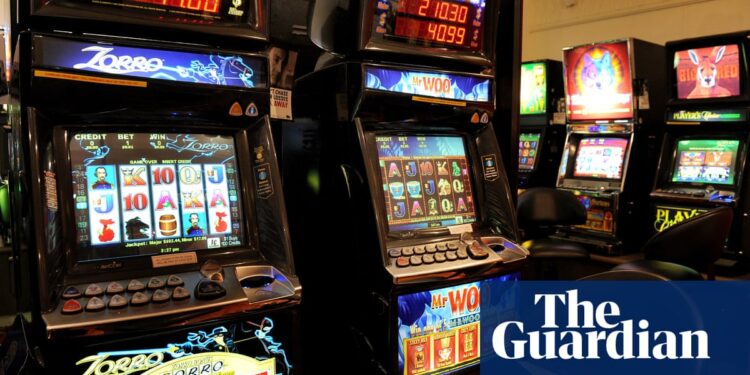Poker machine venues in Victoria have significantly increased the amount of gambling revenue they are spending on themselves, while justifying it as a “community benefit” to get a tax cut.
Victoria’s community benefit scheme provides a tax cut to clubs that reinvest 8.33% of gambling revenue back into the community. But these clubs are able to list upgrades to their own golf courses, renovations and operating costs – which help keep gambling rooms open – as community benefits.
The scheme has outraged government MPs and public health experts who believe the vast majority of money claimed is not benefiting the broader community. The state’s gaming minister, Melissa Horne, has acknowledged concerns about the scheme’s “misuse” and has triggered a review, while one local mayor believes it is “simply a public relations opportunity for venues”.
Despite these criticisms, the Victorian gaming regulator’s latest annual reports show the volume of claims made under the scheme has grown from $239m to $311m – a 30% increase in 12 months. The latest claims covered $1bn in net gaming revenue – money lost by gamblers – up from $762m a year earlier.
Latest disclosures show two clubs claimed more than $2.5m spent on maintaining golf and racecourses as community benefits, but spent less than $70,000 on donations. One claimed $5.7m in operating costs but made no charitable donations.
A Victorian Labor MP, who declined to be named, suggested poker machine venues had increased their community benefit claims because they knew the scheme was under the microscope.
“They are hoping by spending big in the local area they will have people ready to defend them if the government moves to wind back or scrap the scheme,” the MP said. “Clearly they know they don’t have a social licence and are trying to buy one”.
A gambling expert at Monash University, Charles Livingstone, agreed this was a likely reason for the increase. He said “they will have ramped up their claims in order to demonstrate how much they contribute to good works”.
Livingstone assessed statements from 35 Victorian clubs and found only 1.2% – or $2.5m – of all expenditure claimed “was actually attributable to genuine charitable and philanthropic purposes”.
“A somewhat more substantial sum of $39m – or 74.6% of claimed benefits – went to the running costs of the clubs and their facilities, especially racecourses and football grounds/teams,” Livingstone said.
The mayor of Monash city council, Paul Klisaris, said more than $121m was lost to poker machines in his community, last financial year.
“The community benefit scheme for poker machines can never repair the social and economic harm that gambling does in our community, and it is simply a public relations opportunity for venues,” he said.
Klisaris called on the government to introduce a “stronger focus for community services under the community benefit scheme, such as supporting older people and efforts to relieve poverty, rather than other allowable items such as renovations and employee costs, and no gambling advertisements during sports broadcasts”.
An expert on the scheme, based at Curtin University’s school of population health, Dr Louise Francis, said the scheme was not benefiting the broader community as claimed.
The scheme is “providing licensed clubs with a cover story for their communities, despite community contributions that can be described as modest at best and in most cases far less than that”.
“The very modest positive contribution from gambling activities somehow successfully deflects responsibility for the creation of considerable harm,” Francis said.
Horne said the scheme was “an important mechanism to guarantee clubs are investing back into the communities they’re hosted by, to ensure more people can benefit from the revenue they bring in”.
“Following concerns raised around the misuse of community benefits statements, we are undertaking a review and will publicly consult on how to improve the system,” Horne said.
The Victorian Gambling and Casino Control Commission was contacted for comment.






